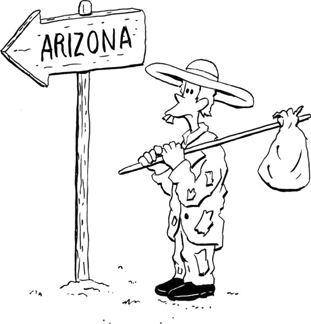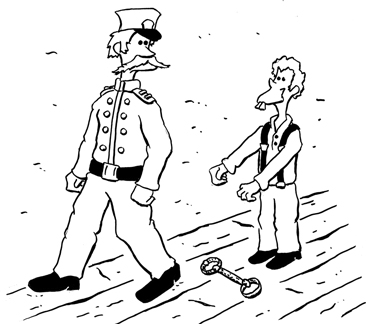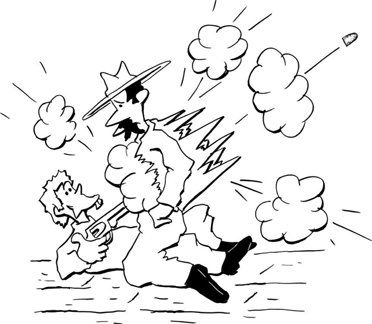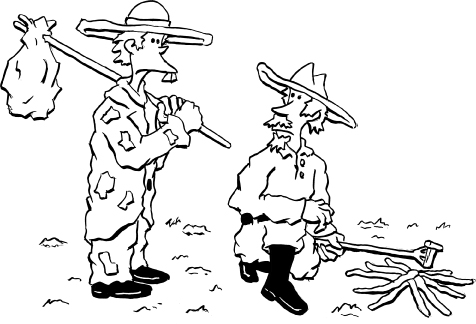|
|
|
Chapter 1 | Chapter 3 |
The Kidhood of
Billy the Kid
A Most Merry and Illustrated History of a Most Unlikely American Icon
Copyright 2011 Charles F. Cooper
Chapter 2 - Henry the Bum

What does a kid do if he is between twelve and sixteen and has no friends, no money, and no place to go? Well we don't know as a kid would do but we know out our Kid did. He headed for Arizona.
That actually made a lot of sense. In that day and age, a good way to avoid the law was simply to move to another state or territory. Extradition from one state or territory was not the routine procedure it's become, and today cooperation between states is much more highly coordinated more than most people realize. Recently a citizen of New England had been in one of the less populated Southwestern states and was briefly detained because he had been exceeding the legally posted speed limit. But since he didn't plan on returning any time soon, he simply tore the ticket and caught his plane home. Naturally he was greatly chagrined to receive a rather testy note from his own state's transportation department saying that if he didn't pay the ticket he would have is driving license revoked. He paid the ticket.
But in the nineteenth century American West once you crossed the border into another state or territory, you were pretty much safe from the law. Even murder was strictly a state or territorial affair. Few people know that Wyatt Earp had been indicted for the murder of an Arizona deputy sheriff, Frank Stilwell, in Tuscon in 1882, but had escaped to Colorado. Attempts by Arizona authorities to extradite him were unsuccessful, and eventually Wyatt made his way to California. He avoided Arizona the rest of his life and died in 1921 in Los Angles, still a fugitive from justice.
So there was no way anyone in New Mexico was going to bother trying to find a kid who had stolen some clothes who had skipped out to Arizona. But the big question was how well could Henry manage on his own. From what we read, it was as well as could be expected provided you didn't expect too much.
According to Robert "Ad" Casey, who met the Kid in 1877, "He was nothing but a kid and bum when I knowed him back then." Since Ad himself was only sixteen at the time, we again wonder if Henry was indeed a full seventeen years of age. But when Ad called Henry a bum, he was being quite accurate. In Arizona Henry quite literally bummed around, living on what he could borrow, beg, or steal.
However, given Henry's tender age and his later history, we need to point out that from the time he left his stepfather, Henry was inevitably armed. In fact, his first handgun may have been stolen from William. What type of pistol Henry carried then we don't know, but later his favorite handgun was the 1877 .41 calibre Colt double action revolver. This put Henry a bit out of mainstream among Old West outlaws since double action revolvers - that is a gun that fired simply by pulling the trigger without having to manually cock the hammer - were not favored by most gunfighters. Generally the extra force needed to pull the trigger reduced the accuracy. However, the extra speed of the double action revolver was evidently what Henry liked and eventually would stand him in good stead.
In Arizona, Henry - the name he still usually went by - got by doing what he could. Although he found some employment on the various ranches, it would be doing odd jobs or maybe acting as cook. The working cowboys didn't see him as a full ranch hand as he was too small and slight to do routine cowboy work.
But if he was in town, the young boy would gravitate toward the saloon. Once more his ability to be more or less accepted by older men and his own willingness to do whatever they wanted - whether it was to get into a game of monte or steal a horse - played to his advantage. But then as now, barrooms were not really places where kids should hang out.
For Henry, his life as a saddle bum in Arizona lasted for about two years and might have continued longer except for what became his first documented verifiable killing. In 1877, Henry moved into Camp Grant where as usual he hung out with the more raffish crowed. Here he became involved in horse stealing on a professional level. But his youth again came to his advantage, and once when he was caught with a stolen horse he was just let go on the spot. Later though the commander of the camp had enough of the young wiseacre squirt who was stealing the army's horses and put him in the guardhouse. Henry escaped, was recaptured, and then put in shackles that were riveted in place. But Henry had relatively large wrists - or rather very small hands - and could often slip cuffs. When the guard went back to the cells to check on Henry, Henry was gone.

Henry did not ride off into the sunset but hung around town. This was also a characteristic of Henry's mode of operation. He usually had more friends than enemies, and his friends would protect him. On the other hand, Henry seems to have taken little effort to hide himself and wandered around town at will. It seems that at this point the commander did not consider Henry worth bothering about any further.
In any case, on August 7, Henry walked into George Adkins' saloon. One story is he was decked out in fancy duds and a tough local blacksmith, Frank Cahill - known as "Windy" to his few friends - began to taunt the kid about being spruced up. But whatever the cause, Henry and Windy got into a fight.
The fight does not seem to have been your typical Hollywood fisticuff match with punches, jabs, uppercuts, and splintering of balsa wood breakaway chairs. Instead, the larger man - Windy weighed about 200 pounds - began pushing and slapping Henry around. Windy called Henry a pimp, after which Henry called Windy a son-of-a-bitch - the favorite epithet of the Old West. Frank threw Billy to the floor, held him down, and kept slapping his face. Then Billy pulled his own gun and shot Frank in the guts. The big man fell to the floor. Billy ran out of the saloon, grabbed the first horse he could find, and rode away.
In that day and age a gunshot wound to the stomach was almost always fatal and most doctor's did not even try to save the victim. That was true in Windy's case. But he lived long enough to give a dying declaration, which gives us the most immediate account of the first killing by the soon-to-be Billy the Kid.
"I, Frank Cahill, being convinced that I am about to die, do make the following as my final statement. My name is Frank P. Cahill. I was born in the county and town of Galway, Ireland. Yesterday, August 17, 1877, I had some trouble with Henry Antrim, otherwise known as Kid, during which he shot me. I had called him a pimp and he called me a son of a bitch. We then took hold of each other; I did not hit him, I think, saw him go for his pistol, and tried to get hold of it, but could not and he shot me in the belly. I have a sister named Margaret Flannigan living in East Cambridge, Mass., and another named Kate Conden, living in San Francisco."

Since Windy believed he was on the verge of eternity his dying declaration had the force of testimony under oath. But according to other witnesses, Windy had actually pinned the young man down and was in fact hitting him. Billy yelled for him to stop but Windy laughed and kept slapping the smaller man. Still back then a dying declaration had considerable force and the coroner's jury ruled Henry Antrim, alias "The Kid", had committed homicide, and the said homicide was unjustifiable.
Despite the ruling, in that day and age, Henry's actions would probably constitute legitimate self defense. Self-defense was very loosely interpreted. Once in Dodge City, "Mysterious Dave Mathers" had snuck up behind a man named Tom Nixon and shot him in the back. Mysterious Dave said that earlier Tom had "threatened him", so it was self defense. The jury agreed.
But as far as the law was concerned, because Henry had skinned out rather than face trial, the young man was no longer just a homeless teenager and petty thief. Instead he was a fugitive and wanted for murder. The best thing for Henry was to get out of the territory. Far better to be wanted for stealing clothes and breaking out of a city jail. So Henry returned to New Mexico but he moved east to the Ruidoso valley where he would first give his name as William Bonney.
